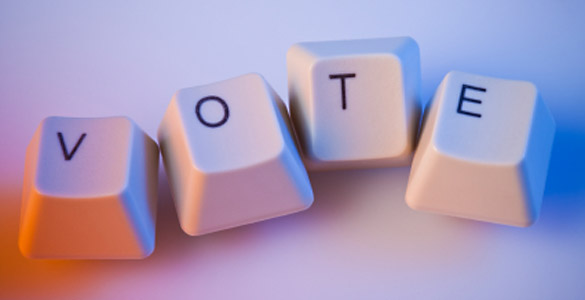MIT to host Cal/Tech Voting Technology Project Seminar
Election Integrity: Past, Present, and Future

Election Integrity: Past, Present, and Future
Saturday, October 1, 2011
9 am to 5 pm
Stata Center, MIT Campus
A Commemorative Event: Looking at Now and Then
The event, which was hosted by the Caltech/MIT Voting Technology Project, commemorates the 25th anniversary of the First National Symposium on Security and Reliability of Computers in the Electoral Process, held in Boston in 1986.
The panelists looked at the issues that first aroused concerns about the use of computers in public elections a quarter of a century ago, and assessed the current situation and future directions for enhancing election integrity. The goal was also to continue dialogues among all stakeholders in the election process, including election administrators, technical professionals, academics, citizens, and vendors. T
How can we enhance election integrity in the U.S.?
A renewed focus on voting technologies and election administration erupted following the 2000 presidential election and the recount controversy in Florida. Since 2000, the focus of analysis has expanded to consider other vital aspects of U.S. public elections, including transparency and the public verification of election results.
The Past
The moderator of the panel on the past will be Peter Neumann, Principal Scientist at SRI International and moderator of the ACM Risks Forum. Panelists addressing the past include Eva Waskell and Kurt Hyde, co-chairs of the First National Symposium in 1986; Roy Saltman, author of reports and a book on voting systems in 1976, 1988, and 2006; Douglas Kellner, Co-chair of the New York State Board of Elections; and William Gardner, New Hampshire Secretary of State and a presenter at the 1986 Symposium.
The Present
The moderator for the panel on the present will be Pam Fessler of National Public Radio. Panelists addressing the present include Pamela Smith, President of Verified Voting; Dan Wallach, Associate Professor at Rice University’s Department of Computer Science; Ian Piper, Director of Certification, Dominion Voting Systems Corporation; and Carolyn Crnich, Clerk/Recorder, and Registrar of Voters, Humboldt County, California.
The Future
The moderator for the panel on the future will be R. Shep Melnick, Thomas P. O'Neill, Jr. Professor of American Politics, Boston College. Panelists addressing the future will be Philip Stark, Professor of Statistics, University of California, Berkeley; Luther Weeks, Executive Director of CTVotersCount.org and Connecticut Citizen Election Audit Coalition; Ronald Rivest, Professor of Electrical Engineering and Computer Science at MIT; and Dana DeBeauvoir, Travis County Clerk, Austin, Texas.
MIT Professor Ronald Rivest will moderate a wrap-up session.
About the Voting Technology Project
Established by Caltech President David Baltimore and MIT President Charles Vest to prevent a recurrence of the problems that threatened the 2000 U.S. Presidential Election. VTP members have studied all aspects of the election process, both in the U.S. and abroad. All the research and policymaking activity seeks to develop better voting technologies, to improve election administration, and to deepen scientific research in the following areas.
Developing better voting systems standards and testing practices
Studying and developing novel and improved post-election auditing procedures
Assessing and evaluating the voting experience in federal elections
Examining ways to make the process of voter registration more secure and more accessible
Evaluating methods of voter authentication, and their effects on the election process
Improving voting technologies
Suggested Links
Professor Charles Stewart III
Feature Article
Making Technology Safe for Democracy
Research Portfolio | MIT SHASS
Can every citizen's vote count?
MIT Department of Political Science
CalTech/MIT Voting Technology Project